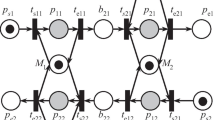Abstract
Periodic rescheduling is a commonly used method for scheduling short-term operations. Through computational experiments that vary plant parameters, such as the load and the capacity of a facility, we investigate the effects these parameters have on plant performance under periodic rescheduling. The results show that choosing a suitable rescheduling policy depends highly on some key plant parameters. In particular, by modifying various parameters of the facility, the performance ranking of the various rescheduling policies may be reversed compared to the results obtained with nominal parameter values. This highlights the need to consider both facility characteristics and what the crucial objective of the facility is when selecting a rescheduling policy. This study considers a variant of the job shop problem, used to model the operation of an industrial-scale analytical services facility using different periodic rescheduling policies. A rolling horizon routine is used to schedule operations over the scheduling horizon. Performance is measured in terms of job throughput, job makespan, and proportion of jobs on time at the end of the scheduling horizon to obtain a more complete understanding of how performance varies between rescheduling policies.




Similar content being viewed by others
Explore related subjects
Discover the latest articles, news and stories from top researchers in related subjects.References
Baykasoğlu, A., & Karaslan, F. S. (2017). Solving comprehensive dynamic job shop scheduling problem by using a grasp-based approach. International Journal of Production Research, 55(11), 3308–3325. https://doi.org/10.1080/00207543.2017.1306134.
Church, L. K., & Uzsoy, R. (1992). Analysis of periodic and event-driven rescheduling policies in dynamic shops. International Journal of Computer Integrated Manufacturing, 5(3), 153–163. https://doi.org/10.1080/09511929208944524.
Dolan, E. D., & More, J. J. (2002). Benchmarking optimization software with performance profiles. Mathematical Programming, 91(2), 201–213. https://doi.org/10.1007/s101070100263.
Dunning, I., Huchette, J., & Lubin, M. (2017). Jump: A modeling language for mathematical optimization. SIAM Review, 59(2), 295–320. https://doi.org/10.1137/15M1020575.
Gupta, D., & Maravelias, C. (2016). On deterministic online scheduling: Major considerations, paradoxes and remedies. Computers and Chemical Engineering, 94(2), 312–330. https://doi.org/10.1016/j.compchemeng.2016.08.006.
Hozak, K., & Hill, J. A. (2009). Issues and opportunities regarding replanning and rescheduling frequencies. International Journal of Production Research, 47(18), 4955–4970. https://doi.org/10.1080/00207540802047106.
Kim, M. H., & Kim, Y.-D. (1994). Simulation-based real-time scheduling in a flexible manufacturing system. Journal of Manufacturing Systems, 13(2), 85–93. https://doi.org/10.1016/0278-6125(94)90024-8.
Koller, R., Ricardez-Sandoval, L., & Biegler, L. (2018). Stochastic back-off algorithm for simultaneous design, control, and scheduling of multiproduct systems under uncertainty. AIChE Journal, 64(7), 2379–2389. https://doi.org/10.1002/aic.16092.
Lagzi, S., Yeon Lee, D., Fukasawa, R., & Ricardez-Sandoval, L. (2017). A computational study of continuous and discrete time formulations for a class of short-term scheduling problems for multipurpose plants. Industrial & Engineering Chemistry Research, 56(31), 8940–8953. https://doi.org/10.1021/acs.iecr.7b01718.
Muhlemann, A. P., Lockett, A. G., & Farn, C.-K. (1982). Job shop scheduling heuristics and frequency of scheduling. International Journal of Production Research, 29(2), 227–241. https://doi.org/10.1080/00207548208947763.
Ouelhadj, D., & Petrovic, S. (2008). A survey of dynamic scheduling in manufacturing systems. Journal of Scheduling, 12, 417–431. https://doi.org/10.1007/s10951-008-0090-8.
Pfund, M. E., & Fowler, J. W. (2017). Extending the boundaries between scheduling and dispatching: Hedging and rescheduling techniques. International Journal of Production Research, 55(11), 3294–3307. https://doi.org/10.1080/00207543.2017.1306133.
Sabuncuoglu, I., & Karabuk, S. (1999). Rescheduling frequency in an FMS with uncertain processing times and unreliable machines. Journal of Manufacturing Systems, 18(4), 268–283. https://doi.org/10.1016/S0278-6125(00)86630-3.
Sabuncuoglu, I., & Kizilisik, O. B. (2003). Reactive scheduling in a dynamic and stochastic FMS environment. International Journal of Production Research, 41(17), 4211–4231. https://doi.org/10.1080/0020754031000149202.
Shafaei, R., & Brunn, P. (1999). Workshop scheduling using practical (inaccurate) data part 1: The performance of heuristic scheduling rules in a dynamic job shop environment using a rolling time horizon approach. International Journal of Production Research, 37(17), 3913–3925. https://doi.org/10.1080/002075499189682.
Vieira, G. E., Herrmann, J. W., & Lin, E. (2000a). Analytical models to predict the performance of a single-machine system under periodic and event-driven rescheduling strategies. International Journal of Production Research, 38(8), 1899–1915. https://doi.org/10.1080/002075400188654.
Vieira, G. E., Herrmann, J. W., & Lin, E. (2000b). Predicting the performance of rescheduling strategies for parallel machine systems. Journal of Manufacturing Systems, 19(4), 256–266. https://doi.org/10.1016/S0278-6125(01)80005-4.
Vieira, G. E., Herrmann, J. W., & Lin, E. (2003). Rescheduling manufacturing systems: A framework of strategies, policies, and methods. Journal of Scheduling, 6(1), 39–62. https://doi.org/10.1023/A:1022235519958.
Yano, C. A., & Carlson, R. C. (1987). Interaction between frequency of rescheduling and the role of safety stock in material requirements for planning systems. International Journal of Production Research, 25(2), 221–232. https://doi.org/10.1080/00207548708919835.
Acknowledgements
The financial support provided by the Natural Sciences and Engineering Research Council of Canada (NSERC) (CRDPJ 468517-14), Ontario Centers for Excellence (OCE), and the industrial partner in the analytical services sector is gratefully acknowledged.
Author information
Authors and Affiliations
Corresponding author
Additional information
Publisher's Note
Springer Nature remains neutral with regard to jurisdictional claims in published maps and institutional affiliations.
Electronic supplementary material
Below is the link to the electronic supplementary material.
Rights and permissions
About this article
Cite this article
Stevenson, Z., Fukasawa, R. & Ricardez-Sandoval, L. Evaluating periodic rescheduling policies using a rolling horizon framework in an industrial-scale multipurpose plant. J Sched 23, 397–410 (2020). https://doi.org/10.1007/s10951-019-00627-5
Published:
Issue Date:
DOI: https://doi.org/10.1007/s10951-019-00627-5




